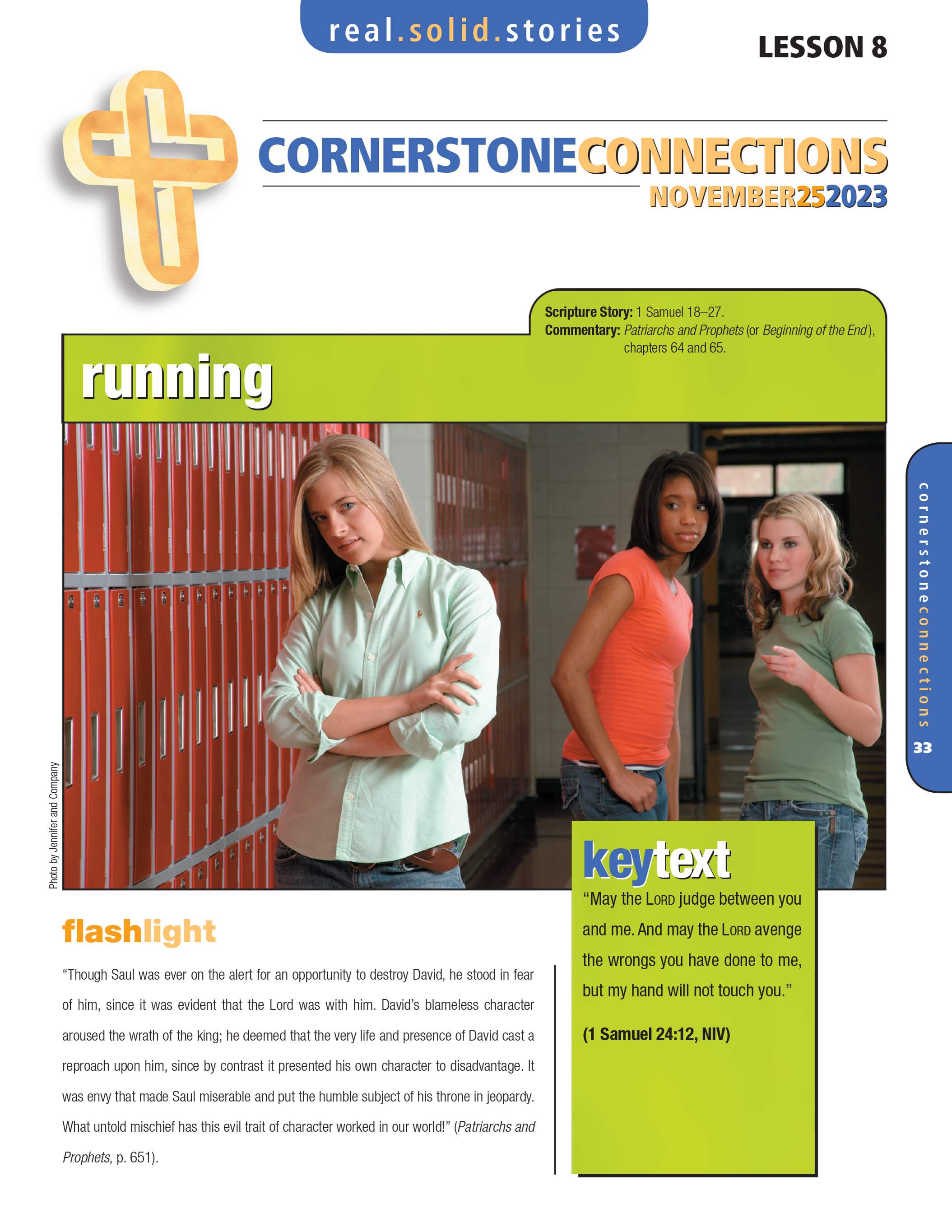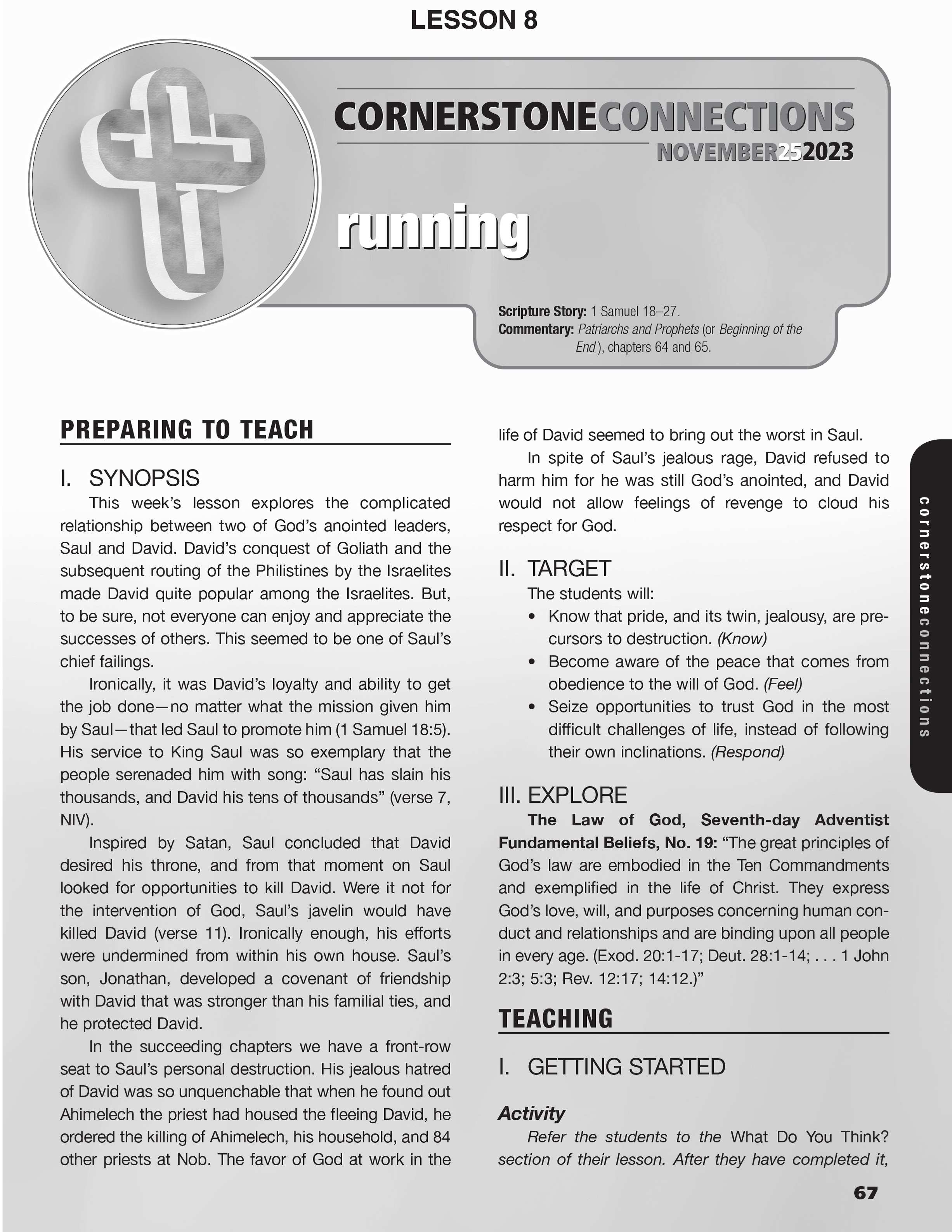“Running”
Click below to download the Cornerstone Connections leader’s guide and student lesson. This week’s resources also include two lesson plans and a discussion starter video which offer different ways of looking at the topic. Each lesson plan includes opening activities, scripture passages, discussion questions, and real-life applications.
Saul is out to destroy the very person who wins his battles for him.
Patriarchs and Prophets (Beginning of the End), Chapter 65
The Large-heartedness of David

SCRIPTURE PASSAGES
OVERVIEW
This week’s lesson touches on themes of fear, jealousy, and reconciliation—sure to be relatable ones to the typical teen.
Ever felt “thrown under the bus”? Perhaps someone comes on strong, really interested in everything you have to say or do, only to act like they never knew you. Perhaps you were excited about the possibilities this new friendship or opportunity presented, only to find yourself blamed for something that wasn’t even your idea.

OPENING ACTIVITY: TABLOID TEXTS
Items needed:
King Saul did far more than just “ghost” David—he tried to kill him, repeatedly, while playing various mind games (and experiencing several mental health crises). Along the way David’s story took some incredible turns.
Assign groups of two or three students each one or two chapters from our lesson (1 Samuel 18-27). Have them thoroughly read through their assigned chapter(s), and give them about 4.5 minutes to come up with tabloid or “clickbait” headlines and the opening paragraph of a news story about what’s happening with Saul and David.
Alternately, they could record a TikTok-style video creatively commenting on the story, giving an “up-to-the-minute” report on the ins and outs of David and Saul’s turbulent relationship.
When people turn on you, what can you do?
DISCUSSION
TRANSITION
This week’s Bible story is packed with details—much more than you’re likely to cover in a single Sabbath school class. Indeed, no Bible character’s life may be covered in more detail than David’s. The nine chapters in this week’s lesson find David in transition, from national hero to fugitive on the run. We see King Saul continue his downward spiral. And we see David beginning to make both the impetuous actions that will haunt his life, and the tender-hearted choices that have kept him beloved for 3,000 years.
BIBLE STUDY GUIDE
One in Spirit
Read 1 Samuel 18:1-16.
After David had finished talking with Saul, Jonathan became one in spirit with David, and he loved him as himself. 2 From that day Saul kept David with him and did not let him return home to his family. 3 And Jonathan made a covenant with David because he loved him as himself. 4 Jonathan took off the robe he was wearing and gave it to David, along with his tunic, and even his sword, his bow and his belt.
5 Whatever mission Saul sent him on, David was so successful that Saul gave him a high rank in the army. This pleased all the troops, and Saul’s officers as well.
6 When the men were returning home after David had killed the Philistine, the women came out from all the towns of Israel to meet King Saul with singing and dancing, with joyful songs and with timbrels and lyres. 7 As they danced, they sang:
“Saul has slain his thousands,
and David his tens of thousands.”
8 Saul was very angry; this refrain displeased him greatly. “They have credited David with tens of thousands,” he thought, “but me with only thousands. What more can he get but the kingdom?” 9 And from that time on Saul kept a close eye on David.
10 The next day an evil spirit from God came forcefully on Saul. He was prophesying in his house, while David was playing the lyre, as he usually did. Saul had a spear in his hand 11 and he hurled it, saying to himself, “I’ll pin David to the wall.” But David eluded him twice.
12 Saul was afraid of David, because the Lord was with David but had departed from Saul. 13 So he sent David away from him and gave him command over a thousand men, and David led the troops in their campaigns. 14 In everything he did he had great success, because the Lord was with him. 15 When Saul saw how successful he was, he was afraid of him. 16 But all Israel and Judah loved David, because he led them in their campaigns.
DISCUSSION
The Wrath of the King
Read the following from 1 Samuel 19:1-24.
1 Saul told his son Jonathan and all the attendants to kill David. But Jonathan had taken a great liking to David 2 and warned him, “My father Saul is looking for a chance to kill you. Be on your guard tomorrow morning; go into hiding and stay there. 3 I will go out and stand with my father in the field where you are. I’ll speak to him about you and will tell you what I find out.”
4 Jonathan spoke well of David to Saul his father and said to him, “Let not the king do wrong to his servant David; he has not wronged you, and what he has done has benefited you greatly. 5 He took his life in his hands when he killed the Philistine. The Lord won a great victory for all Israel, and you saw it and were glad. Why then would you do wrong to an innocent man like David by killing him for no reason?”
6 Saul listened to Jonathan and took this oath: “As surely as the Lord lives, David will not be put to death.”
7 So Jonathan called David and told him the whole conversation. He brought him to Saul, and David was with Saul as before.
8 Once more war broke out, and David went out and fought the Philistines. He struck them with such force that they fled before him.
9 But an evil spirit from the Lord came on Saul as he was sitting in his house with his spear in his hand. While David was playing the lyre, 10 Saul tried to pin him to the wall with his spear, but David eluded him as Saul drove the spear into the wall. That night David made good his escape.
DISCUSSION
Prophetic Encounter
Read 1 Samuel 19:18-24.
18 When David had fled and made his escape, he went to Samuel at Ramah and told him all that Saul had done to him. Then he and Samuel went to Naioth and stayed there. 19 Word came to Saul: “David is in Naioth at Ramah”; 20 so he sent men to capture him. But when they saw a group of prophets prophesying, with Samuel standing there as their leader, the Spirit of God came on Saul’s men, and they also prophesied. 21 Saul was told about it, and he sent more men, and they prophesied too. Saul sent men a third time, and they also prophesied. 22 Finally, he himself left for Ramah and went to the great cistern at Seku. And he asked, “Where are Samuel and David?”
“Over in Naioth at Ramah,” they said.
23 So Saul went to Naioth at Ramah. But the Spirit of God came even on him, and he walked along prophesying until he came to Naioth. 24 He stripped off his garments, and he too prophesied in Samuel’s presence. He lay naked all that day and all that night. This is why people say, “Is Saul also among the prophets?”
DISCUSSION
The Lord’s Anointed
Go over the following verses from 1 Samuel 24.
1 After Saul returned from pursuing the Philistines, he was told, “David is in the Desert of En Gedi.” 2 So Saul took three thousand able young men from all Israel and set out to look for David and his men near the Crags of the Wild Goats.
3 He came to the sheep pens along the way; a cave was there, and Saul went in to relieve himself. David and his men were far back in the cave. 4 The men said, “This is the day the Lord spoke of when he said to you, ‘I will give your enemy into your hands for you to deal with as you wish.’” Then David crept up unnoticed and cut off a corner of Saul’s robe.
5 Afterward, David was conscience-stricken for having cut off a corner of his robe. 6 He said to his men, “The Lord forbid that I should do such a thing to my master, the Lord’s anointed, or lay my hand on him; for he is the anointed of the Lord.” 7 With these words David sharply rebuked his men and did not allow them to attack Saul. And Saul left the cave and went his way.
8 Then David went out of the cave and called out to Saul, “My lord the king!” When Saul looked behind him, David bowed down and prostrated himself with his face to the ground. 9 He said to Saul, “Why do you listen when men say, ‘David is bent on harming you’? 10 This day you have seen with your own eyes how the Lord delivered you into my hands in the cave. Some urged me to kill you, but I spared you; I said, ‘I will not lay my hand on my lord, because he is the Lord’s anointed.’ 11 See, my father, look at this piece of your robe in my hand! I cut off the corner of your robe but did not kill you. See that there is nothing in my hand to indicate that I am guilty of wrongdoing or rebellion. I have not wronged you, but you are hunting me down to take my life. 12 May the Lord judge between you and me. And may the Lord avenge the wrongs you have done to me, but my hand will not touch you. 13 As the old saying goes, ‘From evildoers come evil deeds,’ so my hand will not touch you.
14 “Against whom has the king of Israel come out? Who are you pursuing? A dead dog? A flea? 15 May the Lord be our judge and decide between us. May he consider my cause and uphold it; may he vindicate me by delivering me from your hand.”
16 When David finished saying this, Saul asked, “Is that your voice, David my son?” And he wept aloud. 17 “You are more righteous than I,” he said. “You have treated me well, but I have treated you badly. 18 You have just now told me about the good you did to me; the Lord delivered me into your hands, but you did not kill me. 19 When a man finds his enemy, does he let him get away unharmed? May the Lord reward you well for the way you treated me today. 20 I know that you will surely be king and that the kingdom of Israel will be established in your hands. 21 Now swear to me by the Lord that you will not kill off my descendants or wipe out my name from my father’s family.”
22 So David gave his oath to Saul. Then Saul returned home, but David and his men went up to the stronghold.
DISCUSSION

APPLICATION
David’s years “on the run,” like Moses in the wilderness and Joseph in enslavement, remind us that God is still active in our lives even when things seem to be going in the wrong direction. They also remind us of the importance of faith and integrity, as David’s choices begin to put innocent people in danger—his lie to Abimelech (1 Samuel 21:2) led to the deaths of 85 priests and numerous others (1 Samuel 22:18-19). The Bible gives us not plastic saints but complex, flawed heroes, who may be all too similar to each of us.
FOLLOW UP
Read Psalm 57.
For the director of music. To the tune of “Do Not Destroy.” Of David. A miktam. When he had fled from Saul into the cave.
1 Have mercy on me, my God, have mercy on me,
for in you I take refuge.
I will take refuge in the shadow of your wings
until the disaster has passed.
2 I cry out to God Most High,
to God, who vindicates me.
3 He sends from heaven and saves me,
rebuking those who hotly pursue me—
God sends forth his love and his faithfulness.
4 I am in the midst of lions;
I am forced to dwell among ravenous beasts
—men whose teeth are spears and arrows,
whose tongues are sharp swords.
5 Be exalted, O God, above the heavens;
let your glory be over all the earth.
6 They spread a net for my feet—
I was bowed down in distress.They dug a pit in my path—
but they have fallen into it themselves.
7 My heart, O God, is steadfast,
my heart is steadfast;
I will sing and make music.8 Awake, my soul!
Awake, harp and lyre!
I will awaken the dawn.
9 I will praise you, Lord, among the nations;
I will sing of you among the peoples.
10 For great is your love, reaching to the heavens;
your faithfulness reaches to the skies.
11 Be exalted, O God, above the heavens;
let your glory be over all the earth.
DISCUSSION

SCRIPTURE PASSAGE
LEADER’S NOTE
For a Relational Bible Study (RBS) you’ll want to get into the Scripture passage and encourage the youth to imagine participating in the story while it’s happening. Then you will be able to better apply it to your own situation today.
You will need to ask God for the Holy Spirit to be present as your small group discusses the questions (no more than 3-6 people in a group is recommended). Start with the opening question. It is a personal question and the answer is unique for each individual. There is no right answer and nobody is an expert here, so don’t be surprised when you hear different responses. You are depending on the Holy Spirit to be present and to speak through your group. Say what God prompts you to say, and listen to what others share.
Take turns reading the chapter out loud. Follow that with giving the students some time to individually mark their responses to the questions (a PDF version of the handout is available as a download). This gives each person a starting point for responding when you start to share as a group. Next, begin the discussion by asking the students to share what they marked and why on each question as you work your way through. Feel free to take more time on some questions than others as discussion warrants.
Encourage each person in the group to apply what is discussed to their personal lives and to share with the group what they believe God wants them to do. Then ask them to pray that God will help each of them to follow through in doing so. Remind them to expect that God will show them ways to live out the message of this passage in the coming week, and that they are free to ask others in the group to help hold them accountable.
OVERVIEW
1 Samuel 24 presents a significant episode in the ongoing conflict between David and King Saul. The chapter opens with Saul leading a pursuit of David in the wilderness of En Gedi, where David and his band of loyal followers have sought refuge. As Saul takes a break from his relentless chase, he enters a cave to relieve himself, unaware that David and his men are hidden deep within that same cave.
David's men see this as an opportunity orchestrated by God for David to eliminate his pursuer and become king. They encourage David to seize the moment and kill Saul. However, David, despite being in a vulnerable position, instead chooses a course of action that demonstrates his reverence for Saul as God's anointed king. He quietly approaches Saul and, rather than harming him, cuts off a piece of Saul's robe.
As Saul finishes and leaves the cave, David emerges from hiding to confront him. He calls out to Saul, showing the piece of robe as evidence that he had the opportunity to take Saul's life but chose not to. David emphasizes his loyalty to Saul and explains that he will not harm the one God has anointed as king. He trusts that God will deal with Saul's fate in His own way and time.
Saul is deeply moved by David's actions and words. He recognizes the righteousness of David's behavior and acknowledges that David is destined to become king. Saul's pursuit of David temporarily ends as he returns home.
In the aftermath of the cave encounter, David and his followers continue to evade Saul's relentless pursuit, maintaining their nomadic existence in the wilderness. This ordeal serves as a test of David's patience and faith in God's divine plan. Despite the numerous opportunities to eliminate Saul and secure his own ascent to the throne, David remains steadfast in his belief that God will orchestrate the timing of his kingship.
“Mercy – On the Run”
Share about a time when you were very afraid, and you did nothing wrong.
Read 1 Samuel 24:1-22.
After Saul returned from pursuing the Philistines, he was told, “David is in the Desert of En Gedi.” 2 So Saul took three thousand able young men from all Israel and set out to look for David and his men near the Crags of the Wild Goats.
3 He came to the sheep pens along the way; a cave was there, and Saul went in to relieve himself. David and his men were far back in the cave. 4 The men said, “This is the day the Lord spoke of when he said to you, ‘I will give your enemy into your hands for you to deal with as you wish.’ ” Then David crept up unnoticed and cut off a corner of Saul’s robe.
5 Afterward, David was conscience-stricken for having cut off a corner of his robe. 6 He said to his men, “The Lord forbid that I should do such a thing to my master, the Lord’s anointed, or lay my hand on him; for he is the anointed of the Lord.” 7 With these words David sharply rebuked his men and did not allow them to attack Saul. And Saul left the cave and went his way.
8 Then David went out of the cave and called out to Saul, “My lord the king!” When Saul looked behind him, David bowed down and prostrated himself with his face to the ground. 9 He said to Saul, “Why do you listen when men say, ‘David is bent on harming you’? 10 This day you have seen with your own eyes how the Lord delivered you into my hands in the cave. Some urged me to kill you, but I spared you; I said, ‘I will not lay my hand on my lord, because he is the Lord’s anointed.’ 11 See, my father, look at this piece of your robe in my hand! I cut off the corner of your robe but did not kill you. See that there is nothing in my hand to indicate that I am guilty of wrongdoing or rebellion. I have not wronged you, but you are hunting me down to take my life. 12 May the Lord judge between you and me. And may the Lord avenge the wrongs you have done to me, but my hand will not touch you. 13 As the old saying goes, ‘From evildoers come evil deeds,’ so my hand will not touch you.
14 “Against whom has the king of Israel come out? Who are you pursuing? A dead dog? A flea? 15 May the Lord be our judge and decide between us. May he consider my cause and uphold it; may he vindicate me by delivering me from your hand.”
16 When David finished saying this, Saul asked, “Is that your voice, David my son?” And he wept aloud. 17 “You are more righteous than I,” he said. “You have treated me well, but I have treated you badly. 18 You have just now told me about the good you did to me; the Lord delivered me into your hands, but you did not kill me. 19 When a man finds his enemy, does he let him get away unharmed? May the Lord reward you well for the way you treated me today. 20 I know that you will surely be king and that the kingdom of Israel will be established in your hands. 21 Now swear to me by the Lord that you will not kill off my descendants or wipe out my name from my father’s family.”
22 So David gave his oath to Saul. Then Saul returned home, but David and his men went up to the stronghold.
1. Where does the encounter between David and Saul take place?
2. Why do David's men ask him to take action when he finds Saul in the cave?
3. Instead of harming Saul, what does David do when he has the chance in the cave?
4. What did David show Saul to let him know that he could’ve harmed him?
5. How does Saul react to David's actions and words in the cave?
6. What is the broader biblical theme illustrated by David's behavior?
7. Are you an agent of mercy? If so, explain how.
8. In what areas of your life is God showing you mercy right now?
SUMMARY
The episode in 1 Samuel 24 illustrates an enduring biblical theme of forgiveness and mercy. David's choice not to harm Saul, despite the grave danger he poses, reflects a commitment to God's principles of justice and righteousness. It also stands as a powerful example of turning the other cheek and letting God be the ultimate judge. This act of restraint and forgiveness on David's part contrasts starkly with Saul's earlier attempts to kill David out of jealousy and insecurity. It foreshadows the contrasting destinies of the two characters and underscores the biblical message that vengeance belongs to God, not to humankind. David's actions in this chapter set the stage for his eventual kingship and the fulfillment of God's promises.

APPLICATION
Below, find some application activities to interface with this lesson. These are simply to provide ideas for your use, or to invite you to imagine and create some of your own, as you impact the lives of teens for God’s glory.




